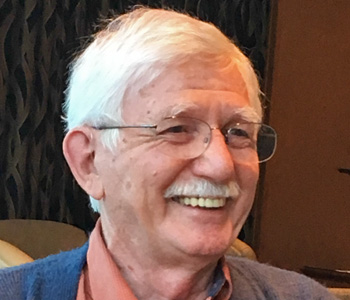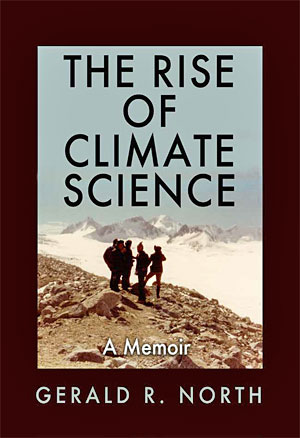
The Rise of Climate Science is about my life and its parallel with the rise of climate science. The book starts with my early life as an only child in Knoxville with my sailor father in the Pacific and my mom at home worried. I was a frail child, awkward, insecure, skinny, and spoiled by a brooding mom—polio was raging as well.
I attended the University of Tennessee in my hometown. To pay my way I became a co-op student at Oak Ridge National Laboratory in the chemistry division dealing with uranium solutions at high temperatures. Lack of lab skills drove me to physics and math. Wonderful mentors at ORNL sent me off to Wisconsin for a PhD in high energy theoretical physics, which I completed in 1966.
After a postdoc at the University of Pennsylvania and tenure at a midwestern branch campus, I took a life changing sabbatical year (1974-75) at the National Center for Atmospheric Research in Boulder where I started a new career as a climate scientist when the field was about to explode. In 1978 I moved to a research scientist position at the NASA/Goddard Space Flight Center as a small group leader in climate science.
I served on five extended visits (1976-85) to the USSR doing research and as part of delegations sharing information and warming relations with Soviet Scientists. At NASA I was lead scientist in proposing and conducting feasibility studies for a satellite program called the Tropical Rainfall Measuring Mission, which turned into a partnership with Japan. In promoting the mission, I made presentations at many sites around the world. TRMM was launched in 1997 and orbited successfully for 17 years. The data were used in the improvement of climate models and other applications. While at Goddard Space Flight Center my group worked in several areas of climate research including the creation of climate models for the study of ancient climates of Earth, predictability and other estimation procedures. Aside from the satellite my most influential work was on the error analysis of data systems.
I moved to Texas A&M University in atmospheric sciences in 1986, where I have worked on mathematical and statistical issues in climate science ever since. I taught classes and mentored graduate students at all levels. As department head, 1995-2003, I helped build a strong program in atmospheric sciences at A&M.
The book recounts these experiences through stories of awe, family, friends, failures, successes, discoveries, forks in the road, good luck and bad. I also visited most of the important hot spots of climate science. I try to tell what it is like to do this kind of work and what it is like in those labs and countries. In chairing committees and serving on boards I learned how big institutions work. I have lots to say about trends in science and academia. I relate and evaluate the history of climate science from my viewpoint from its origins to its establishment as a mature science and the compelling case that anthropogenic climate change is real and that it has been driven by human activities.
I describe my experiences and observations over a career that has grown parallel to a field of scientific and practical interest that has grown from raw data collection to its mature status embracing all the rigors of statistical, physical, and mathematical standards. I came to climate science after training as a theoretical physicist. I was one of many bringing those theoretical ideas and methods to the field.
My first paper in climate science was published in 1975—I was age 37, a time when many say a theorist is done. In physics I was done, but the passion for science remained. I learned statistical methods such as the behavior of random fields being applied to maps in climate science. Using these statistical methods colleagues and I developed methods of estimating the sampling errors committed in the analysis of continuous data maps and in feasibility studies for satellites in different orbital configurations. By this time, I was working at NASA in Greenbelt Maryland.
From my time in Boulder I also constructed simple climate models that could be solved without supercomputers, and these opened the gate for numerous studies in paleoclimatology. Some of these papers clarified the stability of ice caps and the importance of the seasonal cycle in paleobiology and the formation of the ice ages. Later at Texas A&M University I collaborated with great students on the statistical detection of faint signals in the climate system. At that time the effects of global warming were faint, but the distinct patterns of their response in space and time was enough for us to sort out the patterns from sunspot cycles, aerosols, volcanic eruptions, and greenhouse gases. Now, the signals are so strong, one hardly needs this level of fine signal processing.
As I passed through my time in climate science, I visited many different governmental and academic institutions as a reviewer or board member for nonprofit organizations. I learned how these entities operated. I also played a role in foreign visits to institutions in England, Japan and China, mainland and Taiwan, in connection with satellites. I visited the USSR five times, once for a summer, in connection with an agreement intended to warm the relations between the two superpowers. I was able to draw some inferences as to the efficacies of practices in these institutions.
I have concerns with the overuse of metrics in evaluating the status or value of individuals, departments, and whole institutions, all to the detriment of diversity in subcultures, age, and other considerations that are basic to our American heritage. The failure of these practices, when applied to extreme, was a major factor in the fall of the USSR. One problem is that it is so easy to game the system with a kind of corruption, first in tiny steps, but it grows. The institutions work well for a time, and their collective metrics improve, but later it does not work in the nation’s interest.
The book is full of stories connected with each of these segments of my life. I hope different browsers will first look at the table of contents, then open to a section that appeals to them. Not every reader will find every chapter of interest. But there are several that will appeal to any reader.
Most people will probably open the first chapter, and it is the one describing my sabbatical year in Boulder, Colorado. First, it is a beautiful city, and the building I worked in was located in a most remarkable location with rugged mountains, trees, wild deer grazing just outside the windows, etc. There I had the experience of solving a difficult problem in climate science, which was exciting and even intoxicating. This led to awards and recognition throughout the field—rare for a newcomer. Invitations flowed to me including a summer on Cape Cod where world leaders congregated for six weeks, and I was treated like an equal. While there, I was invited to be a member of a delegation of American climate scientists to visit to the USSR. In that fifteen-day trip in September 1976 the delegation consisted of the leading climate modelers in the US. Not only was the trip interesting and exciting; it included a hike up a huge glacier in Uzbekistan. I took the cover picture of my book on that trip. I was one of the guys.
My life and career should be interesting to many people who are considering a life in science, or persons in position to advise young people interested in science. I grew up in the golden age for my choice of science as a profession. I was a late bloomer who could not have made it in many countries or times. I managed to squeeze through all the traditional gates. Although it seems that my path was unique, I found that I was among a cohort of ambitious kids from the lower middle class that were successful. I fear that this path is closed now for this group that I remember so well. I fear that the current concentration of wealth elsewhere shuts the gates on this route for all too many to the detriment of our nation.
Climate science began with geographers and geologists collecting and organizing data. It took an abrupt change in the late sixties to a paradigm of putting physics (mostly through meteorologists and oceanographers, but others as well) into climate models, as they evolved from weather forecast models. Theoretical models required physical, mathematical, and statistical skills for their solution. A key ingredient was the parallel growth of digital computers and other technologies such as drilling cores from the sea floor, lake bottoms and coral formations. Satellite observing systems enabled us to gain a global view of our planet’s climate and how it works. The giant computers, the internet, and satellites systems also corralled the gushing flow of information that was needed by the models.
The model simulations and the data streams set up a dance of iterating between models suggesting data, data testing, and adjusting models. This beautiful picture is now clear enough for us to believe what climate scientists have been telling us for decades. The planetary climate is changing for the warmer with negative ramifications. It is so obvious now that the number of scientifically educated supporters denying the change has nearly vanished. In the terms of Thomas Kuhn, climate science is in the stage of normal science.
Basic climate science is now blessed with funding from numerous governmental agencies in the United States and in nearly every other country in the world. The largest corporations are agreed on its inferences. Climatic conditions evolve on multi-generational time scales. The changes are gradual to the observer, but the manifestations of it are becoming clear to the laypersons at last, and they should begin to deal with it with a mix of adaptations and mitigations.


Gerald R. North was born in Sweetwater, Tennessee, in 1938. He grew up in Knoxville, attended Fulton High School, and earned a BS in Physics from the University of Tennessee. He worked at the Oak Ridge National Laboratory as a co-op student and junior physicist, 1957-61. He earned a PhD in Physics from the University of Wisconsin, Madison, 1966, and was a Postdoc in Physics at the University of Pennsylvania, 1966-68. He worked from Assistant Professor to Full Professor at the University of Missouri-St. Louis, 1968-1978; spent a sabbatical year at the National Center for Atmospheric Research in Boulder, Colorado, 1974-75; served as a research Scientist at NASA/Goddard Space Flight Center in Greenbelt, Maryland, 1978-1986; and University Distinguished Professor at Texas A&M University, 1986-2016, now Emeritus. He is the author or more than 170 refereed scientific publications, 50 book chapters, book reviews, and other publications; co-author of Paleoclimatology (Oxford Press), Introduction to Thermodynamics (Cambridge UP), Energy Balance Climate Models (Wiley-VCH); co-editor of Impact of Global Warming on Texas (2nd Edition, University of Texas Press); and Editor in Chief of Encyclopedia of the Atmospheric Sciences (2nd Ed., Elsevier, 1914). His recent book, The Rise of Climate Science, is featured in his Rorotoko interview.